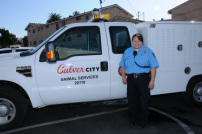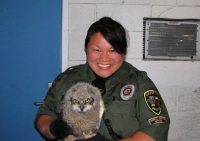Animal Services Officer
As of July 1, 2009, Culver City began its two-year Animal Services pilot program. Culver City Animal Services Officer Shores and Animal Services Officer Stanley handle all animal-related calls for service and investigations in the city. The program is under the supervision of the Culver City Police Department. Officer Shores and Officer Stanley share responsibilities and are on duty Monday through Sunday. The direct telephone number is (310) 253-6143. The Coyote Hotline is (310) 253-6141. In the event of a dog attack or other emergencies, call the Culver City Police Department at (310) 837-1221. Please do not call 911 unless there is a threat to human life. When the Culver City Animal Services Officer is not on duty, calls to the Culver City Police Department will be routed to the Los Angeles County/Carson Shelter at (310) 523-9566. THE MAIN DUTIES OF AN ANIMAL SERVICES OFFICER 1. Display to the community an attitude of protecting animals from people, as well as people from animals. 2. Show a deep concern for public safety and a sincere compassion for all the animals in the community. 3. Foster humane treatment of all animals. 4. Keep records and answer questions from the public about specific animals. 5. Seize dangerous or vicious dogs and present information at hearings on their disposition. 6. Immediately transport an injured animal of any kind to a local contract veterinarian; do follow-up as needed. 7. Check for identification, including microchips. 8. Transport strays without ID to humane shelter. 9. Immediately euthanize animals who are irremediably suffering. 10. Administer bordetella vaccination for dogs prior to entering a shelter. 11. Take digital photos of impounded animals (except wildlife) and post them on the applicable city or county web site along with a description of the animal to assist owners looking for lost pets. 12. Patrol regularly to minimize complaints of animals in violation of leash or pooper-scooper laws. 13. Offer temporary ID tags and a written warning, or issue citations for repeat offenders. 14. Help resolve and minimize barking dog disturbances. 15. Pick up dead animals promptly. 16. Contact owners immediately and return animals to owners as soon as possible, issuing citations as applicable (known as "Return in the Field"). 17. Help residents live with wildlife. 18. Investigate reports of neglect or abuse (cruelty or humane investigations) and mediate disputes where treatment of a neighbor's animal is a serious concern, but not technically illegal. 19. Inspect pet shops and other animal-related businesses (including temporary animal exhibitions) on a complaint basis. 20. Prepare appropriate reports. 21. Provide information on low cost spay/neuter and vaccination programs. 22. Establish relationships with local veterinarians. 23. Hold low-cost rabies vaccination clinics with support from local veterinarians and volunteers. 24. Identify locations where a sign is needed to educate the public, such as areas where animal abandonment is an ongoing problem, to help reduce the number of animals impounded in the future. 25. Work with the local police and fire departments on calls involving animals (for example, assist residents who need help as a result of fire or medical emergency, remove animals from crime scenes and assist in natural disasters or large-scale emergencies). 26. Enforce local ordinances and state/federal law. 27. Work with local rescue groups to help resolve problems. 28. Work with volunteers on developing and presenting humane education programs to schools and community groups. 29. Participate in large community "pet fairs" and adoption events. 30. Spend time needed to educate residents on the basis for certain laws. 31. Work with other city employees to minimize animal abandonment throughout the city. 32. Participate in ongoing training as needed. |
|




